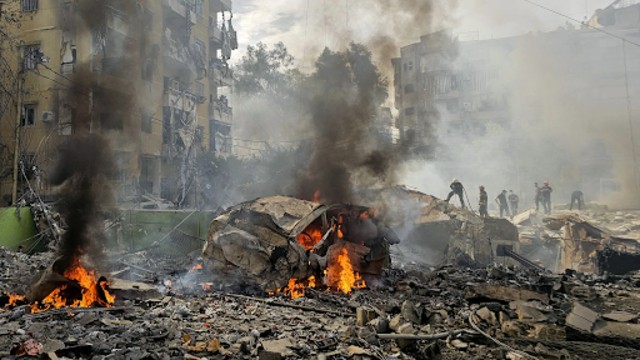
A firefighter hoses down the debris while people gather at the scene of an Israeli airstrike in southern Beirut on Friday. Getty Images
Israel launched airstrikes on southern Beirut on Friday for the first time since the November ceasefire. The strike came after Israel claimed that two rockets were fired into its territory from Lebanon. Israel accused Hezbollah of being responsible, though the group denied any involvement and said it remained committed to the ceasefire.
The Israeli military said it targeted a Hezbollah base in the Dahieh district, which it described as a hub for storing drones. The area is known as a Hezbollah stronghold. The military accused the group of hiding its operations among civilians, using them as human shields.
Before the strikes, Israel warned residents in southern Beirut to evacuate. They released a map highlighting buildings near Hezbollah-linked sites and urged people to move at least 300 meters away. The area includes several schools, which were quickly closed. The Lebanese government ordered students, teachers, and staff to leave the area for their safety.
On the same day, Israel carried out more airstrikes across southern Lebanon. One attack on the village of Kfar Tebnit killed three people, including a woman, and injured at least 18 others. Among the wounded were six children and eight women, according to Lebanon’s health ministry.
In response to the situation, Israeli Prime Minister Benjamin Netanyahu, Defense Minister Israel Katz, and other security officials held an emergency meeting. Katz declared that Lebanon’s capital, Beirut, would be treated the same as any other target if Hezbollah continued its attacks.
"If there is no peace in northern Israel, there will be no peace in Beirut either," Katz warned.
The Lebanese army reported finding a rocket launch site that may have been used for the attack on Israel. They launched an investigation to identify the individuals responsible. Lebanon’s government condemned the Israeli strike, calling it a "clear violation of Lebanese sovereignty and international law."
Meanwhile, Hezbollah claimed on its Telegram channel that Israel was looking for excuses to continue its aggression against Lebanon. Lebanese President Joseph Aoun said his government had contacted U.S. officials about the ceasefire, stressing that both sides must respect the agreement.
However, Netanyahu made it clear that Israel would strike "anywhere in Lebanon" if its security was threatened. He vowed to respond to every attack with force, saying, "We will ensure that all our citizens in the north return to their homes safely."
Tensions between Israel and Hezbollah have been rising, despite the ceasefire in November. The agreement temporarily calmed cross-border violence that had erupted during Israel’s war with Hamas in Gaza, which began in October 2023. However, sporadic clashes have continued.
Israel has carried out dozens of strikes on Hezbollah targets in southern Lebanon since the ceasefire. On Thursday, Israeli forces targeted several vehicles in the region, claiming they were carrying Hezbollah militants. At least six people were killed in that attack, according to Lebanese media.
The recent escalation is part of the ongoing conflict between Israel and Hezbollah. Although the ceasefire reduced violence for a time, both sides remain on edge, and the threat of further clashes looms.















